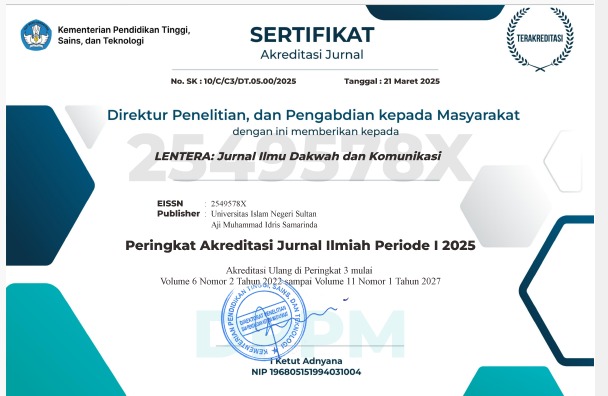RETORIKA DAKWAH K.H.MUHAMMAD DAINAWI PADA PENGAJIAN A’ISYAH DESA PULAU PANGGUNG SUMATERA SELATAN
Abstract
Preaching is an honorific duty in which a muslim delivers his knowledge of Islamic teaching to his/her society sincerely. Hence, the preacher should know elements that play pivotal roles in delivering such messages successfully. Some of those elements are meaningfulness, rightness, the power of context, understanability and reasonability. It is an art for a preacher to guide the lost soul, opening path for the light to get into people’s heart, cure the wounded, arouse the defeated, voice the truth with freshness. One of many succesfull preacher who has been known as a succesfull preacher in Indonesia is K.H. Muhammad Dainawi. Hence, the aim of this research is to understand the rhetoric of preaching of K.H. Muhammad Dainawi. It will also explore many responses given by the audience on K.H.Muhammad Dainawi’s preaching. In designing this research, the writer uses descriptive research. Collecting data techniques in this research are documentation as the main method, observation, and interview.
Keywords: Rhetoric, Preaching, Recitation
References
Efendi Uchjana Onong. Ilmu Komunikasi Teori dan Praktek.Bandung: Rosdakarya, 2002
Fathul Bahri An-Nabiry,Meniti Jalan Dakwah bekal Perjuangan Para da’I, Jakarta: Amza,2008
Hendrikus Wuwur Dori, Retorika Terampil Berpidato, Berdiskusi, Beragumentasi, Bernegosisasi, Yogyakarta, Kanisius,1991
Ilahi Wahyu. Komunikasi dakwah. Bandung: Remaja Rosdakarya,2013
Ma’arif Zainul, Retorika metode komunikasi publik, Jakarta: Raja Grafindo Persada, 2015
Morissan, Teori Komunikasi Individu Hingga Massa, Jakarta:Prenadamedia Group,2013
Rahim Amirudin, Retorika Haraki Seni Berbicara Aktifis Dakwah, ( Solo: PT Era Adicitra Intermedia, 2010
Rakhmat Jalaluddin. Retorika Modern Pendekatan Praktis.Bandung: Remaja RosdaKarya, 2012
Sopia Lena, Pesan-Pesan Dakwah K.H.Muhammad Arifin Ilham, Analisis Retorika Dakwah, Fakultas Dakwah dan Ilmu Komunikasi IAIN Raden Intan Lampung, 2012.
Triono Condro Dwi, Ilmu Retorika Untuk Mengguncangkan Dunia,Yogyakarta,Irtikaz, 2010
Zubair Charis Ahmad dan Anton Bekker. Metode Penelitian Filsafat, Yogyarkarta: Kanisius, 1990
Asep Yulias, Rangkuman Materi Retorika Dakwah, http// bloqspot ,diakses 13/01/2016
Copyright (c) 2018 LENTERA: Jurnal Ilmu Dakwah dan Komunikasi

This work is licensed under a Creative Commons Attribution-ShareAlike 4.0 International License.
Penulis yang menerbitkan artikel di Lentera: Jurnal Ilmu Dakwah dan Komunikasi setuju dengan ketentuan berikut:
- Penulis memiliki hak cipta artikel dan memberikan hak jurnal untuk publikasi pertama dengan karya yang secara simultan dilisensikan di bawah CC-BY-SA atau The Creative Commons Attribution – ShareAlike Licence.
- Penulis dapat membuat perjanjian kontrak tambahan yang terpisah untuk distribusi non-eksklusif versi jurnal yang diterbitkan dari karya tersebut (misalnya, mempostingnya ke repositori institusional atau menerbitkannya dalam sebuah buku), dengan pengakuan atas publikasi awalnya di jurnal ini.
- Penulis diizinkan dan didorong untuk memposting pekerjaan mereka secara online (misalnya, dalam repositori institusional atau di situs web mereka) sebelum dan selama proses pengajuan, karena dapat menyebabkan pertukaran yang produktif, serta kutipan yang lebih awal dan lebih besar dari karya yang diterbitkan (Lihat The Effect of Open Access)
Authors who publish articles in Lentera: Jurnal Ilmu Dakwah dan Komunikasi agree to the following terms:
- Authors retain copyright of the article and grant the journal right of first publication with the work simultaneously licensed under a CC-BY-SA or The Creative Commons Attribution–ShareAlike License.
- Authors are able to enter into separate, additional contractual arrangements for the non-exclusive distribution of the journal's published version of the work (e.g., post it to an institutional repository or publish it in a book), with an acknowledgment of its initial publication in this journal.
- Authors are permitted and encouraged to post their work online (e.g., in institutional repositories or on their website) prior to and during the submission process, as it can lead to productive exchanges, as well as earlier and greater citation of published work (See The Effect of Open Access).












.png)
